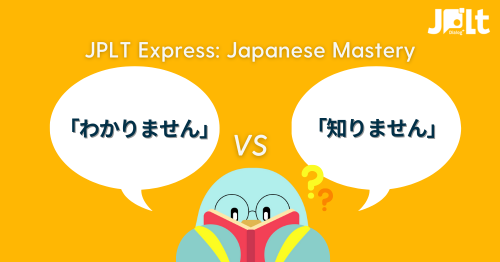[Japanese Learning] How Do “わかりません” (Wakarimasen) and “知りません” (Shirimasen) Differ?
“Even though ‘わかりません’ (wakarimasen) and ‘知りません’ (shirimasen) sound similar…” “When I said ‘知りません!’ (shirimasen), I was told that usage was incorrect…” “I want to understand the difference between ‘わかりません’ and ‘知りません’ clearly!”
While “わかりません” (wakarimasen) and “知りません” (shirimasen) are often used similarly in Japanese, they have subtle differences in meaning. In this article, Eri from JPLT Online Japanese Language School explains how to use each expression with specific examples. Understanding the difference between “わかりません” and “知りません” is important for Japanese learners. Although the expressions seem similar, they are used in different situations. Here’s a detailed explanation with examples.
Using “わかりません” (Wakarimasen)
“わかりません” (wakarimasen) is used when you cannot understand something. It’s suitable when you cannot grasp the content or meaning of a question or situation.
Examples:
In a math class:
- Question: この数式の意味がわかりますか? (Kono sūshiki no imi ga wakarimasu ka?)
- Answer: いいえ、わかりません。 (Iie, wakarimasen.)
- (You know the formula exists but do not understand its meaning or how to solve it.)
After watching a movie:
- Question: 映画のエンディングの意味がわかりますか? (Eiga no endingu no imi ga wakarimasu ka?)
- Answer: いいえ、わかりません。 (Iie, wakarimasen.)
- (You saw the ending scene but do not understand its interpretation.)
In a work meeting:
- Question: 新しいプロジェクトの詳細がわかりますか? (Atarashī purojekuto no shōsai ga wakarimasu ka?)
- Answer: いいえ、説明をもう一度お願いします。わかりません。 (Iie, setsumei o mō ichido onegaishimasu. Wakarimasen.)
- (You heard about the project but do not understand the details.)
Using “知りません” (Shirimasen)
“知りません” (shirimasen) is used when you do not have information or knowledge about something. It’s suitable when you are completely unaware of a fact or content.
Examples:
About a new store:
- Question: 新しいカフェがオープンしたことを知っていますか? (Atarashī kafe ga ōpun shita koto o shitteimasu ka?)
- Answer: いいえ、知りませんでした。 (Iie, shirimasen deshita.)
- (You were unaware of the fact that the café opened.)
About a friend’s news:
- Question: 田中さんが結婚したことを知っていますか? (Tanaka-san ga kekkon shita koto o shitteimasu ka?)
- Answer: いいえ、知りませんでした。 (Iie, shirimasen deshita.)
- (You were unaware of Tanaka-san’s marriage.)
About travel plans:
- Question: あなたは北海道に行ったことがありますか? (Anata wa Hokkaidō ni itta koto ga arimasu ka?)
- Answer: いいえ、知りません。 (Iie, shirimasen.)
- (You have no experience or knowledge of Hokkaido’s tourist spots.)
Detailed Differences Between “わかりません” (Wakarimasen) and “知りません” (Shirimasen)
- “わかりません” (wakarimasen) is used when you have knowledge or information but cannot understand it.
- “知りません” (shirimasen) is used when you do not have the knowledge or information at all.
Comparing Examples:
After hearing news:
- Question: そのニュースの詳細がわかりますか? (Sono nyūsu no shōsai ga wakarimasu ka?)
- Answer: いいえ、わかりません。 (Iie, wakarimasen.)
(You heard the news but do not understand the details.)
- Question: そのニュースを知っていますか? (Sono nyūsu o shitteimasu ka?)
- Answer: いいえ、知りません。 (Iie, shirimasen.)
- (You haven’t heard about the news at all.)
About a recipe:
- Question: このレシピの作り方がわかりますか? (Kono reshipi no tsukurikata ga wakarimasu ka?)
- Answer: いいえ、わかりません。 (Iie, wakarimasen.)
(You have seen the recipe but do not understand how to make it.)
- Question: このレシピを知っていますか? (Kono reshipi o shitteimasu ka?)
- Answer: いいえ、知りません。 (Iie, shirimasen.)
- (You haven’t seen the recipe before.)
Summary
How Are “わかりません” (Wakarimasen) and “知りません” (Shirimasen) Different?
- “わかりません” (wakarimasen) indicates that you cannot understand something. It is used when you have the information but cannot grasp the meaning or content.
- “知りません” (shirimasen) indicates that you lack the information or knowledge. It is used when you are completely unaware of the fact or content.
Using these expressions correctly will enable more natural communication in Japanese. JPLT Online Japanese Language School offers effective learning methods through individual and group lessons, supporting you in improving your vocabulary and practicing real conversations.





